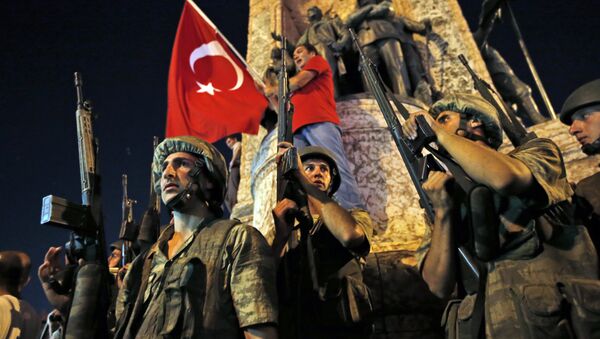1. What Happened
On Friday evening, a group of soldiers and law enforcement officers, who referred to themselves as the Council for Peace in the Homeland, took Istanbul's Ataturk International Airport, two bridges over the Bosphorus and Turkish broadcasters, including TRT and CNN-Turk, under control. They aired a message saying that the military was now in charge. They also imposed martial law and curfew in the country.
More live scenes directly from #Turkey.#TurkeyCoup https://t.co/toDV61PHtc
— عبدالواسع عبدالجبار (@WaseyNaik) 15 июля 2016 г.
The group claimed that they represented Turkey's Armed Forces in their entirety, but large parts of the military sided with President Erdogan. Those who tried to take over the country said they meant to defend constitutional order, human rights and freedom in Turkey despite the fact that the country is ruled by democratically elected leaders.
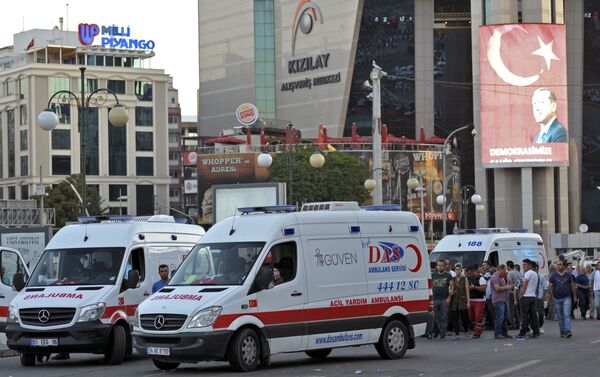
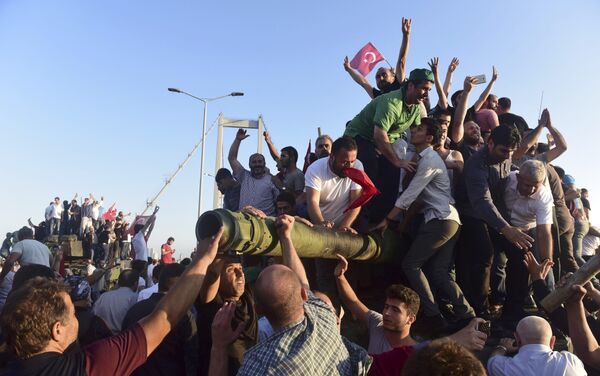
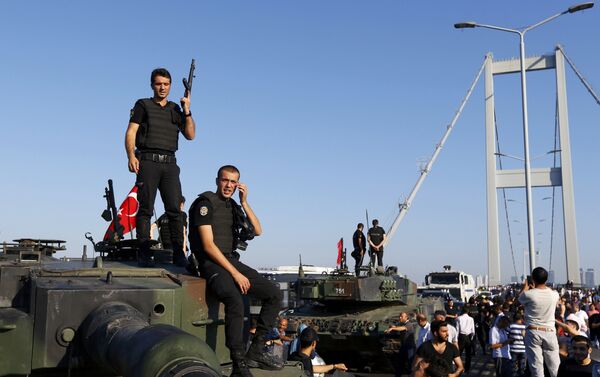
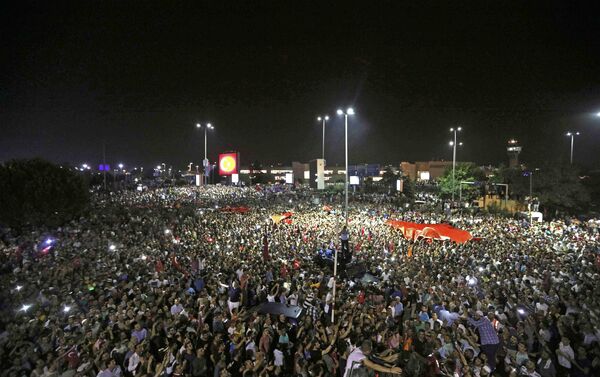
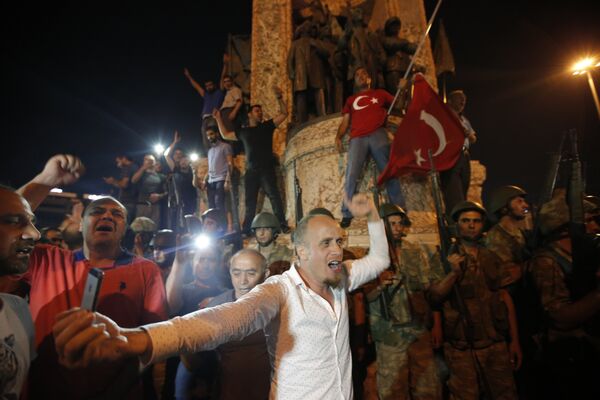
In the chaos that followed bombs went off at the airport in Istanbul, as well as the parliamentary complex in Ankara. Coup plotters are reported to have opened gunfire at the presidential residence and the national intelligence headquarters located in the Turkish capital.
#TurkeyCoup: Military helicopter opens fire at main Turkish intelligence agency MIT headquarters pic.twitter.com/VkvqcnSe2v
— WikiLeaks (@wikileaks) 15 июля 2016 г.
Rebel soldiers used armored vehicles, tanks military aircraft and helicopters to carry out the coup. Prime Minister Binali Yildirim issued an order to shoot down aircraft piloted by coup plotters. Later a Turkish F-16 fighter jet brought down a helicopter that targeted Turkey's state satellite operator Turksat in Ankara.
#TurkeyCoup: Tank crushes yellow taxi pic.twitter.com/mQfCnRsio2
— WikiLeaks (@wikileaks) 15 июля 2016 г.
Meanwhile, Turkey's Chief of Staff General Hulusi Akar was rescued after coup plotters had taken him hostage.
Sixteen people who took part in the coup are said to have been killed in clashes at the military police command, according to Turkey's Police Chief Celalettin Lekesiz. At least 250 people, including Gen. Memduh Hakbilen, the chief of staff of Turkey's command for the Aegean region, have been arrested.
Footage of young coup soldiers being rounded up by civilians and police. They look terrified. pic.twitter.com/nZKpIhVSXc
— reported.ly (@reportedly) 16 июля 2016 г.
In addition, 1,563 pro-coup officers have been arrested across the country. Some of them surrendered, while overs were detained by fellow officers and handed over to police.
2. Erdogan's reaction
President Recep Tayyip Erdogan was staying on the southwest coast for a holiday when the military tried to take over the country. He first addressed the nation using FaceTime, an iPhone app, to urge his supporters to ignore the curfew, take to the streets and protest against the coup.
Stunning: Erdogan's plane landed at #Istanbul's Ataturk Airport, only to take flight once again after explosions ensued. #Turkey #TurkeyCoup
— Michael Wilner (@mawilner) 16 июля 2016 г.
The Turkish strongman landed in Istanbul's Ataturk Airport early on Saturday, saying that the coup was over and pledging to "cleanse" the military. Erdogan also said that he would remain at the airport until the situation returns back to normal. "There is no leaving here until this situation goes back to normal. I will not leave, too," he said.
People power 🇹🇷#Turkeycoup pic.twitter.com/9rncn6gXua
— Carol Malouf (@carolmalouf) 16 июля 2016 г.
3. Who is behind the coup
Turkish authorities pinned the blame for the coup on US-based Islamic cleric Fethullah Gulen, once a key Erdogan ally, and his movement Hizmet that enjoys wide support in Turkey. Gulen "categorically" denied these accusations, adding that he condemned the coup.
4. Casualties
At least 90 people, mostly civilians, are reported to have been killed in clashes following the coup. Approximately 1,000 people have been wounded.
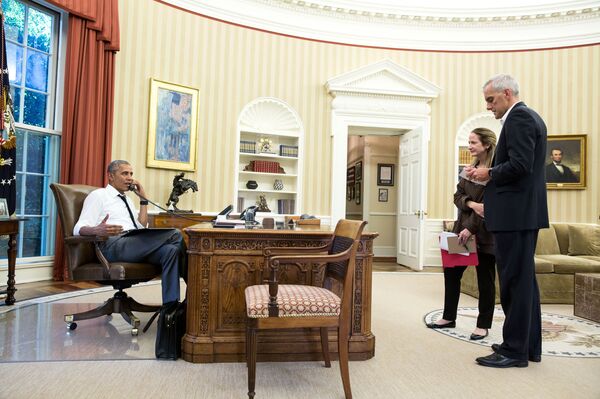
5. World leaders stand behind Turkey's democratically elected authorities
US President Barack Obama urged all parties in Turkey to "show restraint" and "avoid violence."
.@POTUS & @JohnKerry agreed all parties in Turkey should support the democratically-elected Gov't of Turkey, show restraint, avoid violence.
— Department of State (@StateDept) 15 июля 2016 г.
US State Secretary John Kerry described the events that unfolded in Turkey overnight as "a very fluid situation," adding that the US supported "Turkey's democratically-elected, civilian government and democratic institutions."
Statement by Secretary of State @JohnKerry on the situation in #Turkey pic.twitter.com/c32Pb2xTgG
— Department of State (@StateDept) 15 июля 2016 г.
European Council President Donald Tusk said that tensions and challenges could not be solved with guns. "Military coups have no place in modern Turkey," he tweeted.
Tensions, challenges cannot be solved with guns. Military coups have no place in modern Turkey. No alternative to democracy, rule of law
— Donald Tusk (@eucopresident) 16 июля 2016 г.
Iran's Foreign Minister Mohammad Javad Zarif praised the Turks for defending democracy in the country and its leaders, adding that it served as a proof that military coups "have no place in our region and are doomed to fail."
Turkish people's brave defense of democracy & their elected government proves that coups have no place in our region and are doomed to fail.
— Javad Zarif (@JZarif) 16 июля 2016 г.
Deeply concerned about the crisis in Turkey. Stability, democracy & safety of Turkish people are paramount. Unity & prudence are imperative.
— Javad Zarif (@JZarif) 15 июля 2016 г.
NATO Secretary General Jens Stoltenberg shared these sentiments, calling for calm, restraint and "full respect for Turkey's democratic institutions and constitution."
Just spoke to Turkish FM. I call for calm, restraint & full respect for Turkey's democratic institutions and constitution.
— Jens Stoltenberg (@jensstoltenberg) 15 июля 2016 г.

